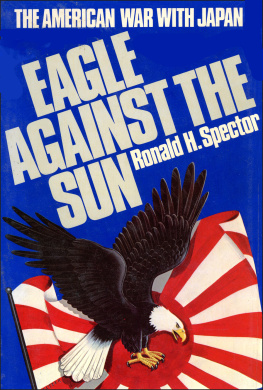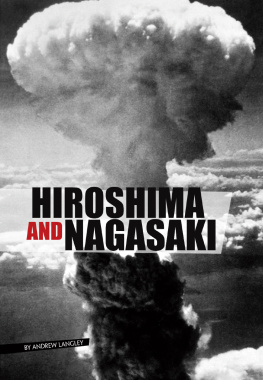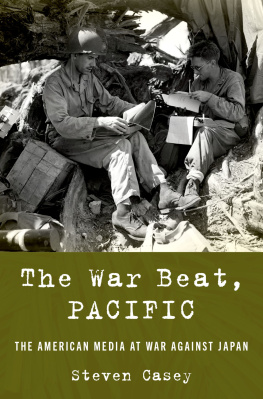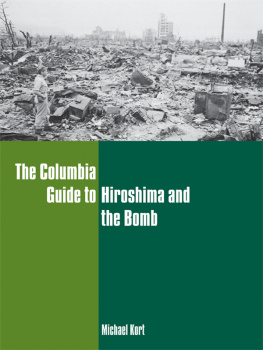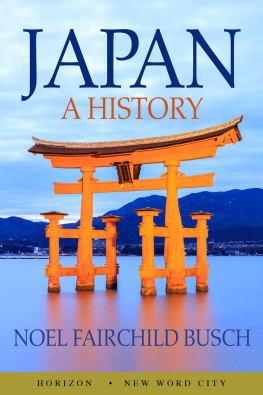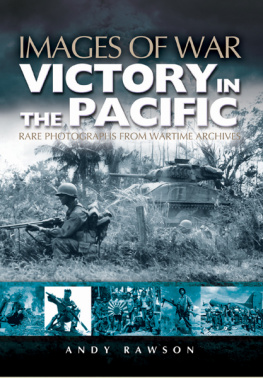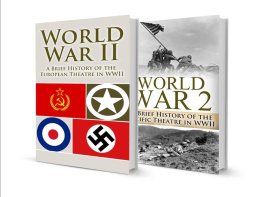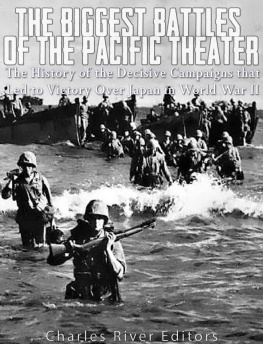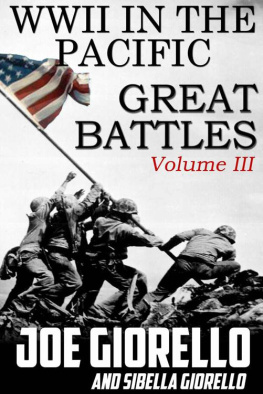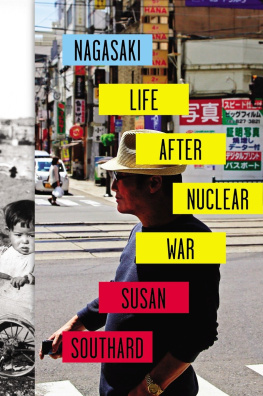Spector - Eagle against the sun : the American war with Japan
Here you can read online Spector - Eagle against the sun : the American war with Japan full text of the book (entire story) in english for free. Download pdf and epub, get meaning, cover and reviews about this ebook. City: New York, year: 1985, publisher: Free Press, genre: History. Description of the work, (preface) as well as reviews are available. Best literature library LitArk.com created for fans of good reading and offers a wide selection of genres:
Romance novel
Science fiction
Adventure
Detective
Science
History
Home and family
Prose
Art
Politics
Computer
Non-fiction
Religion
Business
Children
Humor
Choose a favorite category and find really read worthwhile books. Enjoy immersion in the world of imagination, feel the emotions of the characters or learn something new for yourself, make an fascinating discovery.
Eagle against the sun : the American war with Japan: summary, description and annotation
We offer to read an annotation, description, summary or preface (depends on what the author of the book "Eagle against the sun : the American war with Japan" wrote himself). If you haven't found the necessary information about the book — write in the comments, we will try to find it.
Spector: author's other books
Who wrote Eagle against the sun : the American war with Japan? Find out the surname, the name of the author of the book and a list of all author's works by series.
Eagle against the sun : the American war with Japan — read online for free the complete book (whole text) full work
Below is the text of the book, divided by pages. System saving the place of the last page read, allows you to conveniently read the book "Eagle against the sun : the American war with Japan" online for free, without having to search again every time where you left off. Put a bookmark, and you can go to the page where you finished reading at any time.
Font size:
Interval:
Bookmark:

Thank you for purchasing this Free Press eBook.
Join our mailing list and get updates on new releases, deals, bonus content and other great books from Free Press and Simon & Schuster.
C LICK H ERE T O S IGN U P
or visit us online to sign up at
eBookNews.SimonandSchuster.com

To the memory of my father, David D. Spector
The late Professor Louis Morton, editor of the Wars of the United States series, selected me to write this volume and approved the initial outline shortly before his death. Although he did not live to see the completed work, it is my hope that the end product would not disappoint him.
Many of my colleagues at the Center of Military History, although at times skeptical that the experience of the war with Japan could be meaningfully encompassed within one volume, were kind enough to read and comment on portions of the manuscript. They include Robert W. Coakley, Stanley Falk, Charles MacDonald, Morris J. MacGregor, and Robert Ross Smith. Bernard Nalty of the office of the Chief of Air Force History read a portion of the manuscript and also assisted me in locating relevant Air Force records. John Toland generously gave me access to his extensive notes and files used in the preparation of his prize-winning book, The Rising Sun.
Michael Howard and the late Richard Storry discussed the book with me during my brief visit to Oxford in 1978 and Professor Howard kindly read a portion of the first draft. My old friends Stephen Peltz and Sadao Asada read parts of the manuscript dealing with Japanese plans and policies. Professor Robert Love of the U.S. Naval Academy read parts of the manuscript and shared with me his unparalleled knowledge of Pacific strategy and World War II Navy politics and personalities. Mr. John Hammond Moore kindly allowed me to use a prepublication draft of his excellent book on G.I.s in Australia, Down Under War. Alexander S. Cochran shared with me the results of his wideranging research in the cryptographic records, the results of which have since been published in the Revue dhistoire de la deuxieme guerre mondiale. Thomas C. Hone gave me the benefit of his extensive knowledge of technology and naval policy in the interwar years. Alan R. Millett took time from his own demanding research to give the entire manuscript a thorough reading, as did Peter J. OConnell, who also helped with the early planning and organization of the book.
The late Charles Romanus introduced me to research in the records of the China-Burma-India theater when I was a young journeyman in the Center of Military History. Although the present results may not have met his exacting standards, I could not have had a better guide.
Like many other researchers in the complex and voluminous records of World War II, I have benefited immensely from the knowledge and experience of archivists at various government repositories. At the Naval Historical Center Operational Archives, Dr. Dean Allard, who has been an unfailing help since my graduate days, put his formidable knowledge of World War II at my disposal. I am also grateful to Geri Judkins and Martha Crowley of the Operational Archives Branch and to Mary Wolfskill of the Library of Congress. The Naval and old military records branch and the modern military records branch of the National Archives are staffed by men and women whose collective knowledge of World War II and its records is probably unmatched anywhere in the country. I am especially grateful to William Cunliffe, Terry Hammett, Timothy Nenninger, Edward Reese, and John E. Taylor for their invaluable assistance. I am also grateful to Sally Marks of the Civil and Diplomatic branch of the National Archives, for her patience and prompt assistance with my many requests.
Mrs. Helene Masson-Bruno cheerfully and patiently typed the many drafts and revisions while also acting as perceptive first-line critic and copy-editor. I am also grateful to my editors at The Free PressBarbara Chernow, Joyce Seltzer, and Eileen DeWaldwho patiently saw the book through its lengthy gestation. Finally, I would like to thank my wife Dianne and my sons Daniel and Jonathan, who have had to live with this book for nine long years. The opinions expressed in this book are mine and should not be construed as those of any of the above-mentioned individuals or of any agency of the U.S. government.
The war between the United States and Japan was in many ways a unique and unprecedented conflictthe first, and probably the last, to be waged on such a scale and upon such a stage. It began with a stunning display of air power by the Japanese and ended with the most deadly air raids in history by the Americans. As a naval war, it was unparalleled. More battles were waged at sea and more warships sunk than in all other twentieth century naval campaigns combined. The land campaigns were more limited in size than those in Europe. Nevertheless, in China, the Philippines, and Okinawa they approached the Italian and North African campaigns in scale, if not in duration. Never before had such great armies been projected across hundreds, even thousands of miles of ocean to land on hostile shores, supported only by air cover and warships. And never before had planes and ships achieved such a degree of coordination and power.
The Japanese-American war was the most momentous event in the history of East Asia in half a century. It radically altered the course which the two great Asian powers, Japan and China, had followed for the last three decades and brought an abrupt end to the pattern of Western political dominance in Asian affairs. Until the 1940s, the European nations and their American offspring appeared destined to control or manipulate the countries of Asia indefinitely, with Japan eagerly following in their footsteps in Manchuria and north China. The war decisively changed this state of affairs. The subject peoples of Asia witnessed the sweeping defeat of the western powers at the hands of the Japanese. Many received arms and military training and took the first steps toward independence under Japans hegemony. By the time the colonial powers returned, under the umbrella of the victorious British and Americans, to reclaim their former possessions, they found a rapidly maturing nationalism which would shortly sweep away the last vestiges of western rule more decisively than the most powerful Japanese army.
In his classic, The Island War, Major Frank Hough observed probably no man who served... in the Pacific will read this book without feeling that his outfit has been slighted. And he will be right! In attempting to condense the complex and multidimensional story of that immense conflict into a single volume, I have been obliged to cover an even broader range of subjects and thus to slight not only units and individuals, but entire battles and campaigns as well as significant social and political events. For such omissions I can only beg the readers indulgence on a greater scale than that granted Maj. Hough.
This is primarily an interpretive work. It relies heavily upon the work of American, British, and Australian official historians as well as the many fine monographs, battle studies, biographies, and memoirs which have appeared in the four decades since the war. However, in the case of controversial or little-explored aspects of the war, I have based my account as far as possible on primary sources, particularly those which were not available to official historianscryptographic records, oral history memoirs, and important private collections such as the Ernest J. King papers.
Next pageFont size:
Interval:
Bookmark:
Similar books «Eagle against the sun : the American war with Japan»
Look at similar books to Eagle against the sun : the American war with Japan. We have selected literature similar in name and meaning in the hope of providing readers with more options to find new, interesting, not yet read works.
Discussion, reviews of the book Eagle against the sun : the American war with Japan and just readers' own opinions. Leave your comments, write what you think about the work, its meaning or the main characters. Specify what exactly you liked and what you didn't like, and why you think so.

